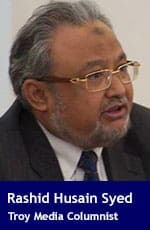Trudeau fights to survive as the relationship with our largest trading partner worsens

For interview requests, click here
Canada’s trade relationship with the United States – one of the largest bilateral partnerships in the world, worth nearly US$1 trillion annually – is under serious threat. U.S. President-elect Donald Trump has pledged to impose a 25 per cent tariff on all Canadian imports, a move that could devastate industries on both sides of the border.
The situation took a bizarre turn following a dinner at Mar-a-Lago late last month, where Prime Minister Justin Trudeau met with Trump to discuss the looming trade crisis. What was intended as a diplomatic effort to cool tensions instead sparked controversy when Trump reportedly joked about Canada becoming the 51st U.S. state. Days later, he posted an AI-generated image of himself atop a mountain, waving a Canadian flag, with the caption “Oh Canada.”
The move, widely viewed as condescending, was quickly followed by more dismissive remarks. During an interview last week, Trump referred to Trudeau as “the Governor of the Great State of Canada,” a jab that seemed designed to belittle both the prime minister and Canada’s sovereignty.
The fallout has been swift and politically costly for Trudeau. Opposition leaders have called for his resignation, citing his failure to protect Canada’s economic interests in the face of escalating trade threats. Adding to the turmoil, Finance Minister Chrystia Freeland resigned earlier this week amid reports of deep disagreements with Trudeau over economic policy and the government’s response to the tariff threat. Freeland’s departure is a significant blow, leaving a leadership vacuum at a time when strong economic direction is desperately needed. Within the Liberal Party, dissent is growing, with some MPs openly questioning Trudeau’s ability to lead Canada through this crisis.
Trudeau has responded defiantly. Speaking at a recent Equal Voice Foundation event, he reframed the discussion by criticizing Trump’s leadership and emphasizing his feminist values: “Just a few weeks ago, the United States voted for a second time not to elect its first woman president. Everywhere, women’s rights and women’s progress are under attack – overtly and subtly.” While the comments were aimed at bolstering Trudeau’s image domestically, they did little to repair his strained relationship with Trump’s incoming administration.
Meanwhile, Ottawa is reportedly weighing retaliatory measures, including export taxes on critical resources such as oil, electricity, uranium, and potash – exports vital to the U.S. economy. However, the proposal has exposed deep fractures among Canada’s provincial leaders.
Ontario Premier Doug Ford, in a rare show of brinkmanship, suggested the province could suspend electricity exports to states like Michigan and New York. “It would turn off the lights to a million-and-a-half Americans,” Ford said, emphasizing that Ontario’s exports supply millions of homes across the border.
Other premiers are less inclined to escalate the situation. Alberta Premier Danielle Smith flatly rejected the idea of export taxes, arguing that such measures would harm Canadian industries more than they would pressure the U.S. “We don’t support tariffs – on Canadian goods or U.S. goods – because all it does is make life more expensive for everyday Canadians and Americans,” Smith stated. Saskatchewan Premier Scott Moe echoed Smith’s concerns, warning that cutting off key exports like potash and uranium would be a “self-destructive” move for his province.
Quebec Premier François Legault offered a different solution after a recent meeting with Trump in Paris. Legault claimed Trump’s primary concern is border security, not trade, and suggested Ottawa focus on addressing illegal immigration. “He told me very clearly we can avoid those tariffs if we do what needs to be done with the borders,” Legault said, urging Trudeau to put forward a plan to tighten border controls.
The stakes for Canadians could not be higher. A 25 per cent tariff on Canadian goods would drive up the cost of everything from groceries to vehicles, placing yet another burden on households already struggling with inflation. While politically attractive, retaliatory measures could disrupt key industries and trigger job losses across energy, agriculture, and manufacturing – sectors vital to Canada’s economic stability.
For Trudeau, the challenge is immense. He must navigate sharp divisions among provincial leaders, manage escalating tensions with Trump, and reassure Canadians that the government has a plan to protect the economy. The growing calls for his resignation and the loss of key allies like Freeland only add to the pressure.
What happens next will determine whether Canada can protect its economic interests without deepening the rift with its largest trading partner. As tensions rise, Canadians are left to wonder how a once-stable trade relationship has become so uncertain – and whether Trudeau is the leader who can withstand the storm.
Toronto-based Rashid Husain Syed is a highly regarded analyst specializing in energy and politics, particularly on the Middle East. In addition to his contributions to local and international newspapers, Rashid frequently lends his expertise as a speaker at global conferences. Organizations such as the Department of Energy in Washington and the International Energy Agency in Paris have sought his insights on global energy matters.
Explore more on Canadian economy, Canada-U.S. relations, Trade, Trudeau government
The views, opinions, and positions expressed by our columnists and contributors are solely their own and do not necessarily reflect those of our publication.
© Troy Media Troy Media is committed to empowering Canadian community news outlets by providing independent, insightful analysis and commentary. Our mission is to support local media in building an informed and engaged public by delivering reliable content that strengthens community connections, enriches national conversations, and helps Canadians learn from and understand each other better.

